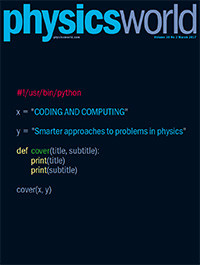Tag archives: software
Coding and computing: the March 2017 issue of Physics World is out now
Physics these days wouldn’t succeed without software. Whether those lines of code are used to control new apparatus, make sense of fresh experimental data or simulate physical phenomena based on the latest theories, software is essential for understanding the world. The latest issue of Physics World, which is now live in the Physics World app for mobile and desktop, shines a light on how some physicists are exploiting software in new ways, while others are reinventing the hardware of a computer itself – binary isn’t the only way to go.
Sometimes there are so much data that software collaboration is the best way forward. In the issue, physicists Martin White and Pat Scott describe how the GAMBIT Collaboration is creating a new, open-source software tool that can test how theories of dark matter stack up against the wealth of data from various experiments such as direct searches for dark matter and the Large Hadron Collider. And with software development being so essential for physics research, data scientist Arfon Smith argues that we need to adopt better ways of recognizing those who contribute to this largely unrewarded activity. Columnist Robert Crease explores the other extreme: whether software can be patented.
Meanwhile, in an emerging field straddling both coding and computing, researcher Maria Schuld explains how quantum computers could enhance an already powerful software approach known as machine learning. (You can also read her article on physicsworld.com here.) Further into the realm of raw computing, physicist Jessamyn Fairfield describes the quest to develop a new kind of hardware that is physically, and functionally, similar to the computers inside our very own heads. As for how our brains process information, don’t miss a glimpse into the mind of physicist Jess Wade who has created a doodle based on the work Fairfield describes.
View all posts by this author | View this author's profile
